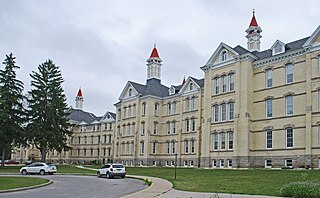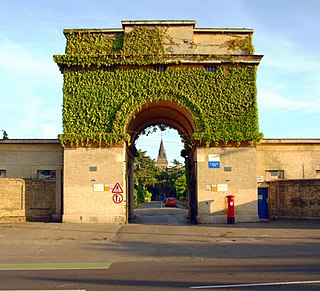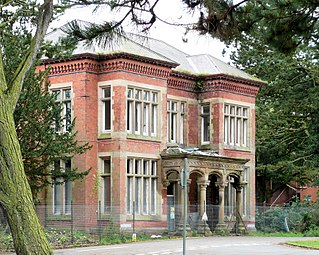Related Research Articles

Psychiatric hospitals, also known as mental health units or behavioral health units, are hospitals or wards specializing in the treatment of mental disorders, such as schizophrenia, bipolar disorder, and major depressive disorder. Psychiatric hospitals vary widely in their size and grading. Some hospitals may specialize only in short-term or outpatient therapy for low-risk patients. Others may specialize in the temporary or permanent containment of patients who need routine assistance, treatment, or a specialized and controlled environment due to a psychiatric disorder. Patients often choose voluntary commitment, but those whom psychiatrists believe to pose significant danger to themselves or others may be subject to involuntary commitment and involuntary treatment. Psychiatric hospitals may also be called psychiatric wards/units when they are a subunit of a regular hospital.

Social work is an academic discipline and practice-based profession that concerns itself with individuals, families, groups, communities, and society as a whole in an effort to meet basic needs and enhance social functioning, self-determination, collective responsibility, optimal health, and overall well-being. Social functioning is defined as the ability of an individual to perform their social roles within their own self, their immediate social environment, and the society at large. Social work applies areas, such as sociology, psychology, human biology, political science, health, community development, law, and economics, to work with individuals across the lifespan, engage with client systems, conduct assessments, and develop interventions to solve social problems, personal problems, and bring about social change. Social work practice is often divided into micro-work, which involves working directly with individuals or small groups; and macro-work, which involves working with communities, and fostering change on a larger scale through social policy. Starting in the 1980s, a few universities began social work management programmes, to prepare students for the management of social and human service organisations, in addition to classical social work education.

The Transport and General Workers' Union was one of the largest general trade unions in the United Kingdom and Ireland – where it was known as the Amalgamated Transport and General Workers' Union (ATGWU) to differentiate itself from the Irish Transport and General Workers' Union – with 900,000 members. It was founded in 1922 and Ernest Bevin served as its first general secretary.
The Dock, Wharf, Riverside and General Labourers Union (DWRGLU), often known as the Dockers' Union, was a British trade union representing dock workers in the United Kingdom.
The Workers' Union was a general union based in the United Kingdom, but with some branches in other countries. During the 1910s, it was the largest general union in the UK, but it entered a rapid decline in the 1920s, and eventually became part of the Transport and General Workers' Union (TGWU).

Deinstitutionalisation is the process of replacing long-stay psychiatric hospitals with less isolated community mental health services for those diagnosed with a mental disorder or developmental disability. In the late 20th century, it led to the closure of many psychiatric hospitals, as patients were increasingly cared for at home, in halfway houses and clinics, in regular hospitals, or not at all.

The Modern Records Centre (MRC) is the specialist archive service of the University of Warwick in Coventry, England, located adjacent to the Central Campus Library. It was established in October 1973 and holds the world's largest archive collection on British industrial relations, as well as archives relating to many other aspects of British social, political and economic history.

St Bernard's Hospital, also known as Hanwell Insane Asylum and the Hanwell Pauper and Lunatic Asylum, was an asylum built for the pauper insane, opening as the First Middlesex County Asylum in 1831. Some of the original buildings are now part of the headquarters for the West London Mental Health NHS Trust (WLMHT).
The Hospital and Welfare Services Union (HWSU) was established in 1918 as the Poor Law Workers Trade Union. It recruited from all ranks in the poor law service. Within a year it claimed 10,000 members.
George Gibson CH was a British mental hospital attendant, trade unionist and public servant who was General Secretary of the National Asylum Workers' Union, later renamed the Mental Hospital and Institutional Workers' Union, from 1913 to 1947, then of the Confederation of Health Service Employees, into which the previous union merged, from 1947 to 1948. He was ruined through his largely innocent association with the fraudster Sidney Stanley, which was exposed by the Lynskey Tribunal in 1948.

Whittingham Hospital was a psychiatric hospital in the parish of Whittingham, near Preston, Lancashire, England. The hospital opened in 1873 as the Fourth Lancashire County Asylum and grew to be the largest mental hospital in Britain, and pioneered the use of electroencephalograms (EEGs). It closed in 1995.
The British Association of Social Workers (BASW) is the largest professional association of registered social workers and qualified care managers in the United Kingdom. The association has a members' code of ethics that outlines best social work practice and works to support social workers and care managers through education and resources. Headquartered in Birmingham, BASW has regional offices in England (Birmingham), Northern Ireland (Belfast), Scotland (Edinburgh), Wales (Cardiff), and North Wales.

The Amalgamated Society of Boilermakers, Shipwrights, Blacksmiths and Structural Workers (ASB) was a trade union in the United Kingdom. Many of its members worked in shipbuilding, in which industry it was the leading trade union, while over time it also developed strength in engineering and construction.

The lunatic asylum was an early precursor of the modern psychiatric hospital. The Quakers in Philadelphia were the first in America to make an organized effort to care for the mentally ill. The newly opened Pennsylvania Hospital in Philadelphia provided rooms in the basement complete with shackles attached to the walls to house a small number of mentally ill patients.

St. Brendan's Hospital was a psychiatric facility located in the north Dublin suburb of Grangegorman. It formed part of the mental health services of Dublin North East with its catchment area being North West Dublin. It is now the site of a modern mental health facility known as the "Phoenix Care Centre". Since the official opening of the Richmond Lunatic Asylum in 1815 the Grangegorman site has continuously provided institutional facilities for the reception of the mentally ill until the present day. As such the Phoenix Care Centre represents the continuation of the oldest public psychiatric facility in Ireland.

The Confederation of Health Service Employees (COHSE) was a United Kingdom trade union representing workers primarily in the National Health Service.

The Trades Union Congress (TUC) is a national trade union centre, a federation of trade unions in England and Wales, representing the majority of trade unions. There are 48 affiliated unions, with a total of about 5.5 million members. The current General Secretary is Frances O'Grady.

Rainhill Hospital was a very large psychiatric hospital complex that was located in Rainhill, formerly Lancashire but now Merseyside, England.
The Operative Society of Masons, Quarrymen and Allied Trades of England and Wales was a trade union representing stonemasons and related workers in the United Kingdom.
The National Federation of Professional Workers (NFPW) was a trade union federation in the United Kingdom.
References
- 1 2 3 Papers of the National Asylum Workers' Union and the Mental Hospital and Institutional Workers' Union held by Warwick University
- ↑ Abel-Smith, Brian (1960). A History of the Nursing Profession. London: Heinemann. p. 132.